EVERETT, Wash., May 6, 2022 – Health and Human Services Secretary Xavier Becerra and Rep. Rick Larsen (WA-02) met with local stakeholders for a fentanyl overdose prevention and substance abuse roundtable at Providence Regional Medical Center in Everett today.
“Personally, I have a large family, and in that regard, [addiction] has impacted my extended family,” said Rep. Larsen, a strong supporter of regaining momentum in the fight against the opioid crisis.
“It’s difficult because I think sometimes family members feel hopeless; feel that they can’t help. They don’t know what to do because, very likely, family members aren’t trained for this kind of stuff, so they likely don’t know what to do. So as much as family members need support and help, more importantly, they need to know that there are places they can turn to [for support].”
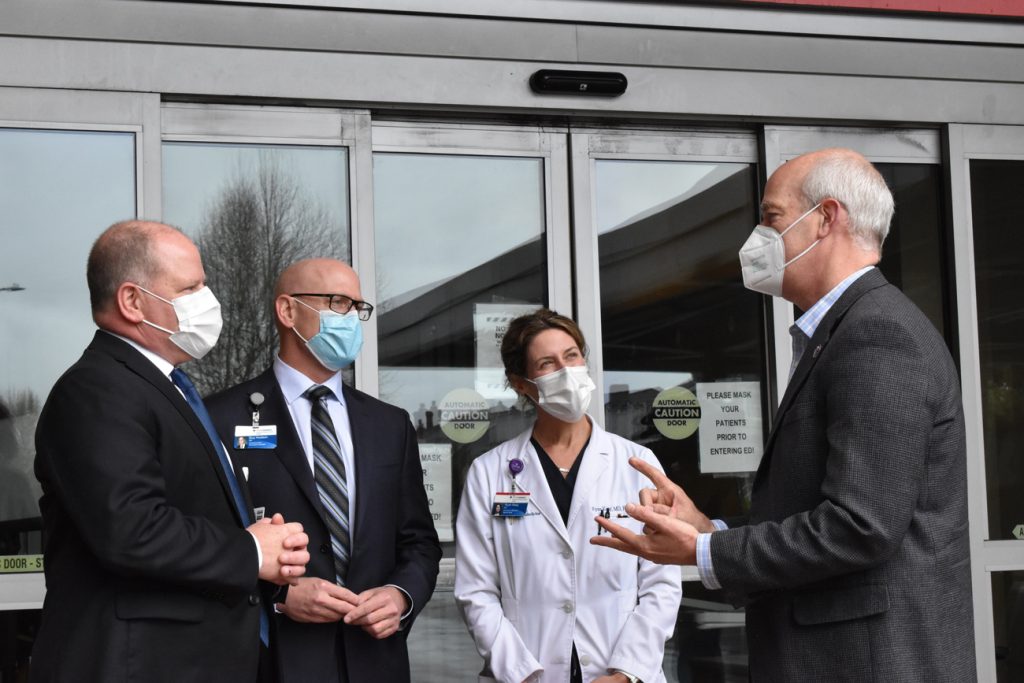
The pandemic dramatically worsened the opioid crisis in Washington state. Between 2019 and 2021, opioid-involved overdose deaths increased by more than 80% across the state and more than 40% in Snohomish County, according to data from the County’s Medical Examiner’s Office.
The circulation of fentanyl, a synthetic opioid 80-100 times stronger than morphine, has also led to increase overdoses in the county.
Others attending today’s fentanyl overdose prevention and substance abuse roundtable were Laura Knapp, Director of Behavioral Health at Providence Regional Medical Center, Crystal Buckner, Chris Dickison, Division Chief at North County Fire and EMT, Kelly Schwartz, Nurse at Providence Regional Medical Center, Everett Mayor Cassie Franklin, Darren Redick, CEO of Providence Regional Medical Center, Dr. Guy Hudson, President of Strategy and Operations at Providence Regional Medical Center, Ingrid Ulrey, Regional X Director of HHS, Snohomish County Executive Dave Somers, Lt. Mike Braley of the Everett Police Department, and Shawn Fredrick, Administrative Officer with the Snohomish Health District.
A personal story of recovery
Crystal Buckner, a patient of Providence Everett’s detox program who has been sober for six months, was invited to share her story at today’s roundtable. Buckner struggled with addiction from an early age, but during a period of sobriety, she became a single mother at age 20 and earned a degree in Chemical Dependency Counseling.
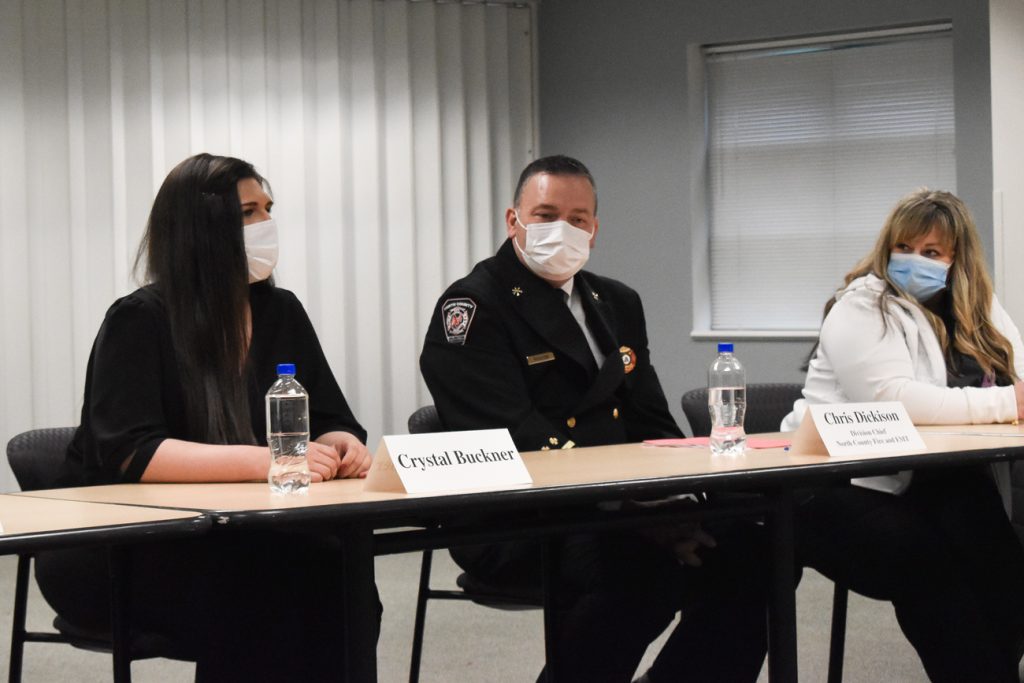
Buckner remembers having it all at one point—a family, a house, and a dream job helping addicts stay clean. “But I still became a victim of our fentanyl crisis,” she said. “And I lost everything. I lost my job. I lost my home. I lost my daughter. I lost my car. For the first time in my life, I was homeless, and for the first time in my life, I was arrested.”
Having been addicted to heroin for six years, Buckner said that when it became available, fentanyl was a natural progression of her disease. “If you’ve never been through fentanyl withdrawal, it’s unimaginable,” she said. “It’s a million times worse than you could ever think.”
Last August, she fell into a coma due to fentanyl withdrawal. She lost her vision, ability to walk, 40% of her memory, and almost died.
Despite being so close to losing her life, she says, “each treatment provider I sought out turned me away; Providence didn’t. I needed a medical detox, and Providence was here when I needed it,” she said.
“I think we can do better. I think addicts deserve better. I think we can do better for families and society,” Buckner continued. “And because I think that providence is a great example of quality addiction medicine and ongoing recovery care, I am alive today to tell my story.”
Snohomish County’s response to the fentanyl crisis
Snohomish Health District Administrative Officer Shawn Fredrick detailed the District’s efforts to prevent overdoses and reduce substance use disorders. Ofc. Frederick highlighted the Health District’s multi-agency coordination group, Snohomish Overdose Prevention, which brings together public health, emergency management, human services, law enforcement, emergency medical services, and other key partners that address the impacts of opioids.
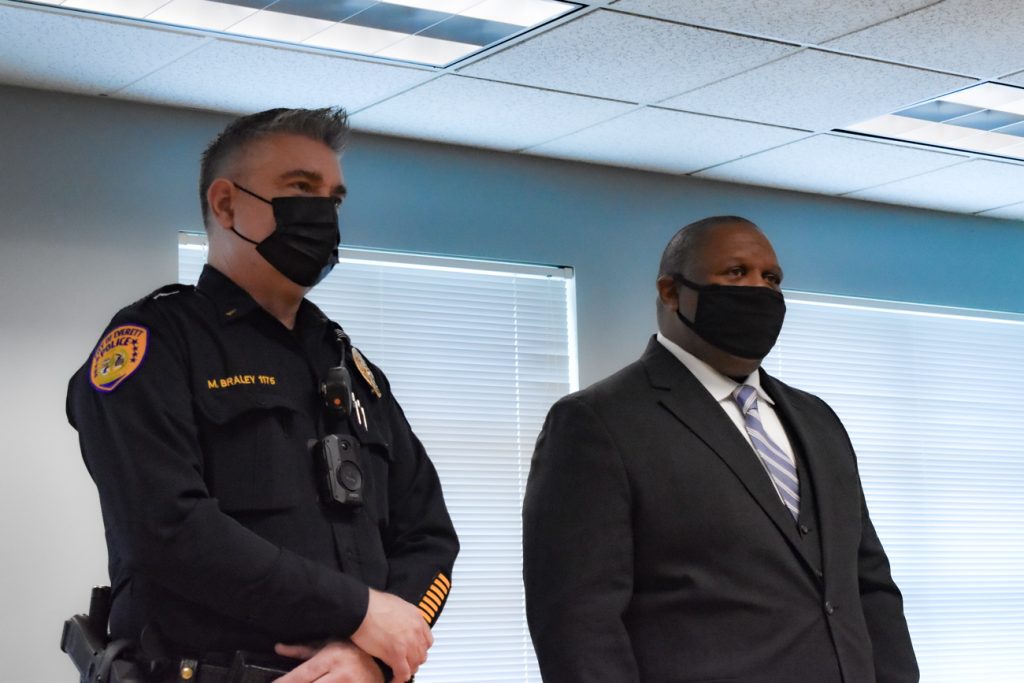
The Snohomish Health District (SHD) has been working with partners on substance use prevention and increasing the capacity for treatment and recovery in rural communities around Darington and Skykomish. Such efforts include supporting full-time counselors in rural districts, supporting local drug take-back events, and creating a community education program to help people find treatment.
The County has also been working closely with community coalitions in schools, providing training on how to use Naloxone to reverse opioid overdoses and ensuring schools have a supply of naloxone on hand. SHD tracks supplies of Naloxone for eight police departments in the County.
“There are a number of important efforts on the way to reduce the loss of life due to overdoses and to reduce substance use disorder and its impacts in our county,” said Ofc. Frederick. “This crisis has many layers, and there’s still much work to be done.”
Federal actions to prevent fentanyl deaths
President Biden proposed a budget that would dedicate $51.7 billion to behavioral health for congress to approve. Sec. Becerra recounted how, thanks to Congressmen Larsen and the American Rescue Plan Act, billions of dollars in grants have been allocated to mental and behavioral health services, as well as workforce retention in the medical field and financial incentives for personnel to train and work in rural areas.
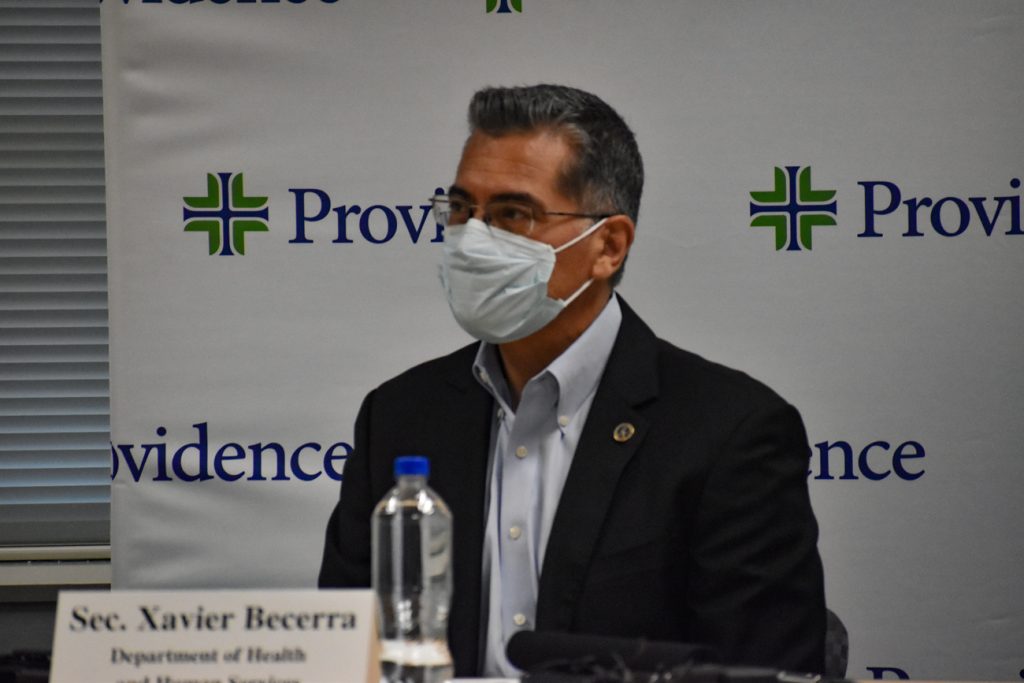
“So we’re going to do things. We just need to get the wind underneath our wings to make that happen, so that’s where congressmen Larsen’s going to need some help to pass the President’s budget so we can do the things that make it possible for someone like Crystal [Buckner] to tell such a phenomenal story,” the Secretary said.
Health and Human Services Secretary Becerra would later comment on how the Federal Government has begun supporting harm reduction programs by providing fentanyl strips.
“Up until this year, at the Federal level, we would have been accused of trying to help someone stay on drugs by offering fentanyl strips because what we’re learning is that so much of these drugs are now laced with fentanyl at dangerous levels that folks are killing themselves,” Sec. Becerra said.
“We’re going to support anything that shows evidence of success,” he added.
Rep. Larsen noted the significance of the Comprehensive Addiction Recovery Act [CARA] of 2016. “[The CARA] created the foundation that we can use at the Federal Level to fund efforts, not just on prevention of drug addiction, but treatment of addiction and treatment of behavioral health disorders, and importantly, recovery,” Rep. Larsen said.
“Recovery is very critical to behavioral health success and is very instrumental to the success of recovering from drug addiction. So the CARA was really designed to fund a continuum of care, and we’ve continued to fund that over the last several years,” he explained.
For Rep. Larsen, today’s roundtable discussion was partially intended to encourage further funding for the CARA; “[to] put more dollars into it so we have better pay and better support for the caregivers and more opportunities for folks to move from treatment to recovery,” he explained.
Providence Regional Medical Center saving lives
Providence Regional Medical Center in Everett, the host of today’s event, is a key partner with the Snohomish Health District. During the roundtable, Providence Nurse Kelly Schwartz spoke of the devastating impacts of fentanyl abuse to behavioral health efforts.
“Fentanyl has changed my job immensely,” said Schwartz, who has over 20 years of experience as a nurse. “It’s like nothing we’ve ever seen. The withdrawal is horrible.”
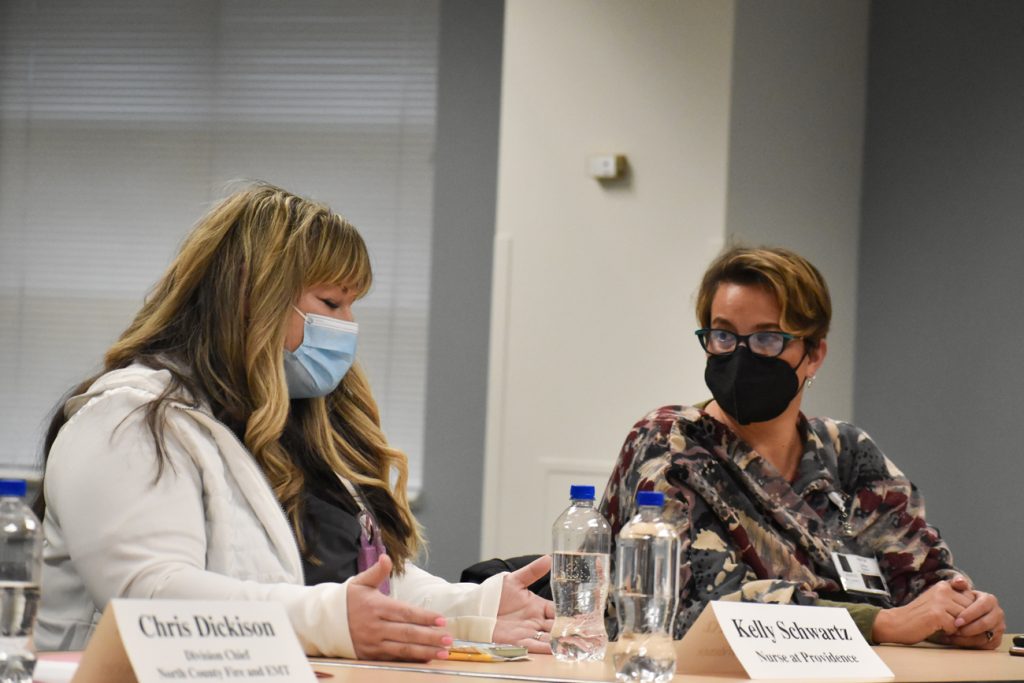
According to Schwartz, the issues start when patients are admitted into treatment. “There’s not enough beds for immediate placement, which is what you need with this disease,” she said.
Schwartz related how some patients experiencing fentanyl withdrawals go into delirium, which does not occur during other opioid withdrawals.
“When that happens, they’re basically a one-to-one patient, and sometimes even a two-to-one to keep them safe,” she said while noting how such scenarios deplete hospital resources.
Fentanyl patients also require more long-term treatment than users of other opioids, and according to Schwartz, most users “drop off” somewhere during their 60 to 90-day program
“I know there’s always hope, but I’ve gone into my medical director’s office, and it’s just like, ‘what are we going to do?’ It just seems like it’s just going to get worse,” she said of the opioid and fentanyl crisis. “And the only thing I see is that we are going to have to make drastic changes in the way that we treat, and we have started but just drastic, really with an effort on harm reduction.”
Schwartz voiced her support for harm reduction programs and shared success stories she’s witnessed.
“I’ve had so many people that have gotten into detox because they met weekly with their needle exchange person and then that relationship forms. And people don’t believe that that happens, it does happen. Those programs do work. Yeah, it doesn’t happen like that,” she snaps, “but it happens over time. Those people do get into recovery.”
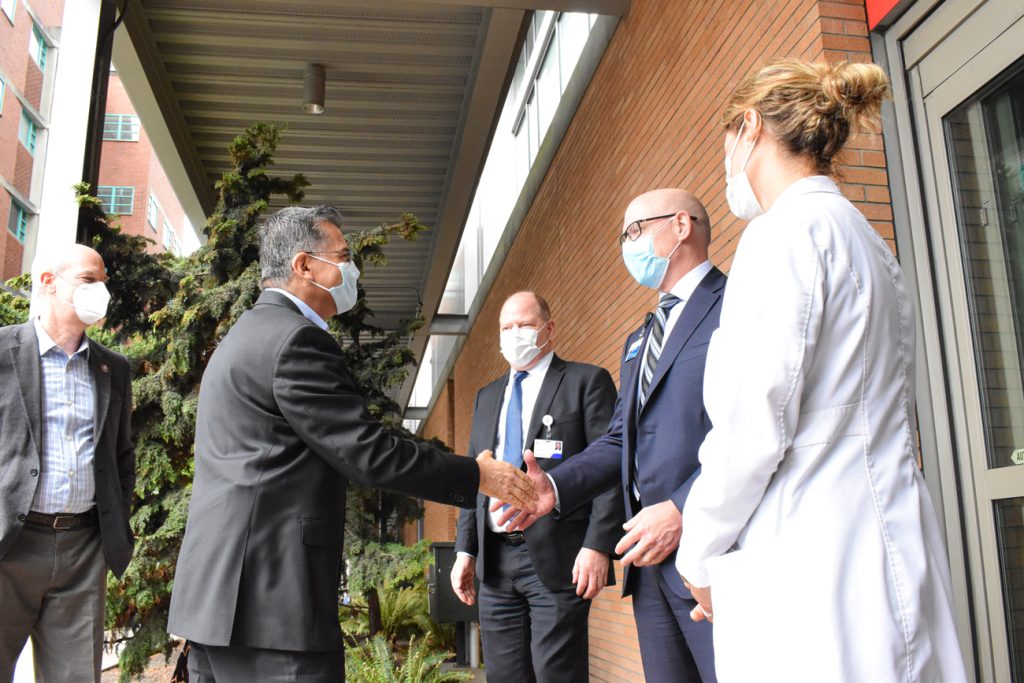
Ongoing recovery care was emphasized by the Director of Behavioral Health, Laura Knapp. Currently, 65% of patients in Providence’s recovery unit come from fentanyl use disorder.
Offering patients ongoing treatment outside of a medical center, according to Knapp, is a major barrier nationally, but especially in Snohomish County.
“Our behavioral workforce has been really, really challenged,” she begins. “Internally, at Providence, that’s the case, but also amongst our community providers, so when someone is ready to go to treatment, sometimes there’s not that resource.”
In response, Providence opened a Behavioral Health Urgent Care clinic two years ago, “which is a really unique way for us to address patients who are in crisis as an alternative to our emergency department,” Knapp says.
The clinic employs trained psychiatric nurse practitioners, social workers, and peer counselors who can treat patients struggling with addiction or mental health needs in real time.
Providence also opened a 24-bed psychiatric unit last year and even set up pathway treatment programs so that patients who struggle with addiction can begin to get help even if they arrive with an unrelated medical need.
Providence is also collaborating with primary care physicians to provide medication for addiction treatment in primary care settings.
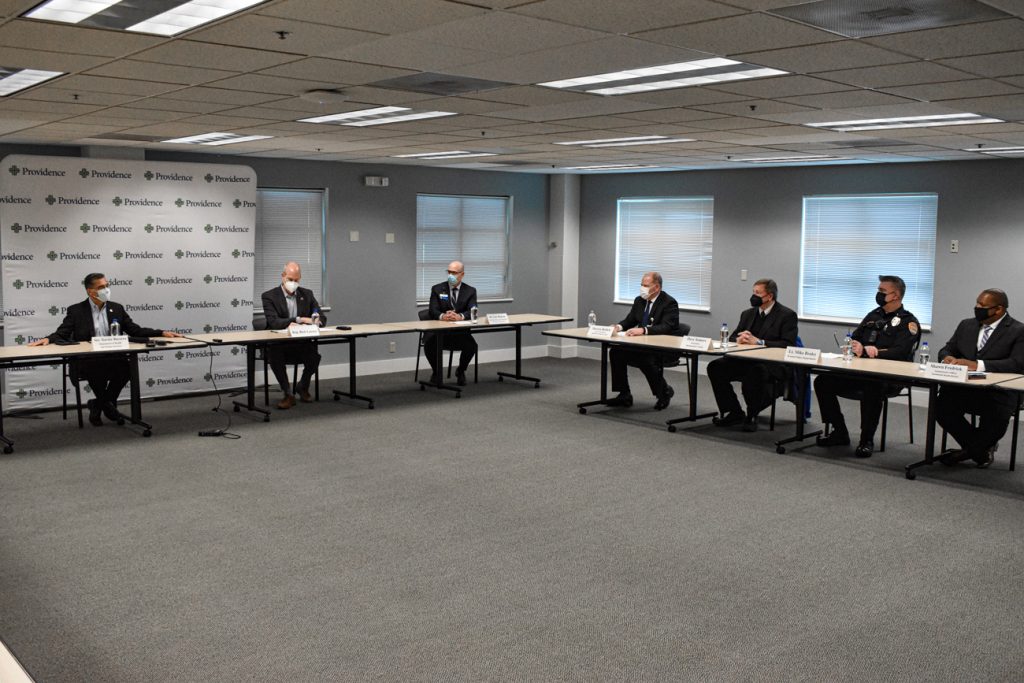
Author: Bo John Brusco













One Response